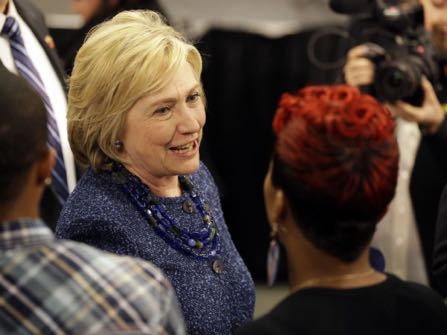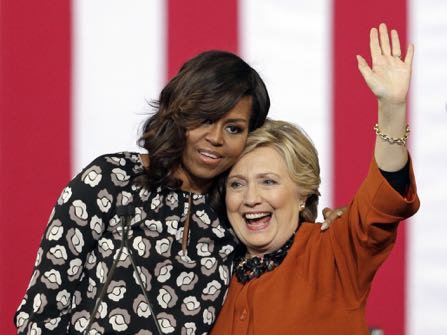BLM, BLACK ACTIVISTS THROW SUPPORT TO HILLARY

PHILADELPHIA (AP) — Six months into Hillary Clinton’s presidential campaign, she met with a group of Black Lives Matter activists in Washington to make her case and seek their support.
DeRay Mckesson left disappointed, feeling Clinton lacked a grasp of the issues he had spent the previous year protesting in cities like Ferguson, Missouri, and Baltimore, including police brutality and income inequality. He came out of the October 2015 meeting unwilling to support her publicly.
On Wednesday, though, The Washington Post published an op-ed by Mckesson announcing his plans to vote for her after meeting again with her last week in Cleveland. He said he heard a candidate well-versed in the things that matter to him.
“There was no platform the first time,” the 31-year-old Mckesson said in a telephone interview. “There is a platform now. I reflected on the things I’ve heard her say, commit to and seen in writing, and that’s how I came to my decision.”
A growing number of black millennials who were initially skeptical of Clinton — questioning her commitment to end mass incarceration, confront racial bias in policing and repudiate her husband’s tough policies on welfare and crime during the 1990s — now support her.
Some do so enthusiastically, others pragmatically, because they find Donald Trump so repugnant with his talk of violence in “inner cities” and the need for “law and order.”
But other activists are still not convinced that Clinton will address their priorities and are withholding their votes and public support as she makes a final push to enlist a group seen as key to her path to victory in November.
“It’s a challenge and we’re just facing it head-on,” said Clinton aide Christopher Huntley, who focuses on millennials. He said the candidate is mounting a full-court press to reach young black voters and is being helped by “folks who have been skeptical now realizing and coming to that ‘Aha!’ moment that she’s the best one to carry our water.”
Clinton’s platform includes establishing national guidelines on police use of force; police training in recognizing implicit bias; legislation to end racial profiling; increased funding for body cameras; sentencing reform; and federal aid to create jobs for young people, ex-convicts and small businesses in poor communities.
To help make her case to black voters, she has enlisted the Mothers of the Movement, a group of black women who have lost children to violence. They include the mothers of Trayvon Martin and Michael Brown. The mothers joined Clinton on the campaign trail in North Carolina last weekend.
Clinton is also reaching out to Black Lives Matter activists, several of whom have social media platforms that give them tremendous influence, and is campaigning at historically black colleges, deploying surrogates like New Jersey Sen. Cory Booker and tapping the likes of rapper Jay-Z to perform a get-out-the-vote concert.
On her 69th birthday on Wednesday, Clinton stopped by “The Breakfast Club,” a popular urban radio show. Over the weekend, she tweeted a shout-out to historically black Howard University, which was celebrating its homecoming.
According to a new GenForward poll of Americans ages 18 to 30, 49 percent of blacks say they will definitely vote in November. That’s similar to the percentage of all young people. Eighty percent of the likely black voters say they plan to cast their ballots for Clinton, versus 4 percent for Trump.
Clinton has enjoyed strong support from older African-Americans, particularly in the South, where she defeated primary rival Bernie Sanders with 77 percent of the overall black vote in states with exit polling. But in the GenForward poll, black millennials reported supporting Sanders over Clinton during the primary season 46 to 28 percent.
In endorsing Clinton last week in an Elle magazine interview, Brittany Packnett — a St. Louis organizer who was also at both Clinton meetings — voiced some of the conflict felt by young black voters during the election season.
“These young people are understandably asking, ‘What is the point of continuing to participate in this system that assaults me?'” Packnett said. “I have been wrestling with the same frustrations, but I have a responsibility to young people, to my community and to our work. The best way I can use my platform is to support Secretary Clinton.”
Many black millennials had doubts about Clinton early in the campaign because of a 1996 speech in which she referred to young “super-predators” in the black community. She has since apologized for the remark.
In a heated moment on the campaign trail in April, Philadelphia activist Erica Mines confronted former President Bill Clinton about his support for welfare reform that activists say punished poor people and a crime bill that put many blacks behind bars.
Mines said she plans to vote for an independent next month.
“I do not believe she is someone who can be trusted,” Mines said of Clinton. “She has been pushed because of Bernie Sanders to be more left than she has in the past. I do not trust her to do what is right for our communities. I only hear her talk about the middle class, which is not representative of those living at or below the poverty line.”
Ferguson protester Johnetta Elzie said Clinton has done nothing to earn her endorsement, and she will not vote for her. Elzie was among the protesters who met with Clinton in October 2015, but did not meet with her last week.
“There is no way I could promise to black people that she’s not going to be horrible for us,” she said. “That’s not the hill I want my credibility to die on. I’m not going to guilt-trip people. I’m encouraging people to vote however you want on Nov. 8 — or don’t vote.”
MICHELLE OBAMA JOINS HILLARY IN N.C.

INSTON-SALEM, N.C. (AP) — Trailing with time running out, Donald Trump denounced both Hillary and Bill Clinton Thursday as creatures of a corrupt political system who would use another pass at the Oval Office to enrich themselves at the expense of American families. Clinton turned to popular first lady Michelle Obama to rally voters in North Carolina, a state that could deliver a knockout blow to Trump.
Trump seized on newly public emails in which longtime Bill Clinton aide Doug Band describes overlapping relationships of the Clintons’ global philanthropy and the family’s private enrichment. The emails were among thousands stolen from the private account of a top Clinton aide, part of a hacking the Democratic campaign has blamed on the Russians.
“Mr. Band called the arrangement ‘unorthodox.’ The rest of us call it outright corrupt,” Trump declared during a rally in Springfield, Ohio. “If the Clintons were willing to play this fast and loose with their enterprise when they weren’t in the White House, just imagine what they’ll do in the Oval Office.”
Band wrote the 2011 memo to defend his firm, Teneo, describing how he encouraged his clients to contribute to the foundation and provide consulting and speaking gigs for Bill Clinton. Some of his work included obtaining “in-kind services for the president and his family — for personal travel, hospitality, vacation and the like.”
Clinton made no mention of the revelations as she campaigned alongside Mrs. Obama, their first joint appearance of the campaign. The first lady has emerged as one of Clinton’s most powerful surrogates, passionately touting her experience and denouncing Trump as too divisive and thin-skinned for the White House.
“We want someone who is a unifying force in this country, someone who sees our differences not as a threat but as a blessing,” Mrs. Obama said as she addressed an enthusiastic, 11,000-person crowd, one of Clinton’s biggest of the campaign. Trump often points out that his crowds are generally larger than his rival’s.
Mrs. Obama also accused Trump’s campaign of trying to depress voter turnout and panned his provocative assertion that the results of the Nov. 8 contest may be rigged.
“Just for the record, in this country, the United States of America, the voters decide elections,” the first lady said. “They’ve always decided.”
With a lead in the race for weeks, Clinton’s campaign is concerned that her advantage could prompt some of her backers to stay home on Election Day or cast protest votes for a third-party candidate. Nearly all of her recent events have been in states where early voting is already underway, aimed at using the rallies to prompt supporters to bank their votes now.
Following her rally with Mrs. Obama, Clinton greeted students at an early voting site at University of North Carolina-Greensboro. She then dropped in on a homecoming pep rally at nearby North Carolina Agricultural and Technical State University, where she was greeted by a DJ blasting hip-hop, a dance troupe, a marching band and deafening cheers at the surprise stop.
Clinton entered the final stretch of the race with a resounding cash advantage over Trump: As of last week, her campaign and Democratic partners had $153 million in the bank, more than double what Trump’s side had available.
New campaign finance reports also show Trump seems to have cut off his personal contributions. While he had routinely given about $2 million a month, as of Wednesday, he’d covered $33,000 in October campaign costs, giving nothing more.
Another troublesome sign for Trump: The Republicans’ congressional campaign committee has released a new TV ad that praises a GOP House member who has said Trump has “disqualified himself” to be president. The ad for Rep. Robert Dold of Illinois calls him an “independent voice” who has “stood up” to Trump, the first time the committee, which is devoted to electing Republicans to the House, has used a message openly critical of the party’s presidential nominee.
Still, the hacked emails and recent news of an “Obamacare” premium hike have appeared to hand Trump a pair of potent gifts in the campaign’s final fortnight. The Republican charged Thursday that the rate hikes were “making it impossible for parents to pay their bills and support their families.”
But to the frustration of many in his party, Trump has struggled to stay on message. While campaigning in Ohio, he criticized Clinton for being too tough on Vladimir Putin, another surprisingly favorable comment from Trump about the Russian leader.
“She speaks very badly of Putin, and I don’t think that’s smart,” he said.
Trump has been repeatedly criticized, by Republicans as well as Democrats, for failing to denounce Putin. He’s also refused to say whether he believes Russia is behind the hacking of Democratic groups, although intelligence agencies have pinned the blame on Moscow.
Earlier Thursday, he also repeated his insistence that Captain Humayun Khan, a Muslim-American soldier killed in Iraq, would be alive if Trump he had been president during the war. Khan’s family is supporting Clinton and has harshly criticized Trump’s calls for temporarily banning Muslims from the United States.
Clinton leapt on Trump’s comments Thursday, declaring: “I don’t understand how anyone would want to rub salt in the wounds of a grieving family.”
Lemire reported from Springfield, Ohio. AP writers Lisa Lerer, Kathleen Hennessey and Jill Colvin contributed to this report.
PHOTO: AP















